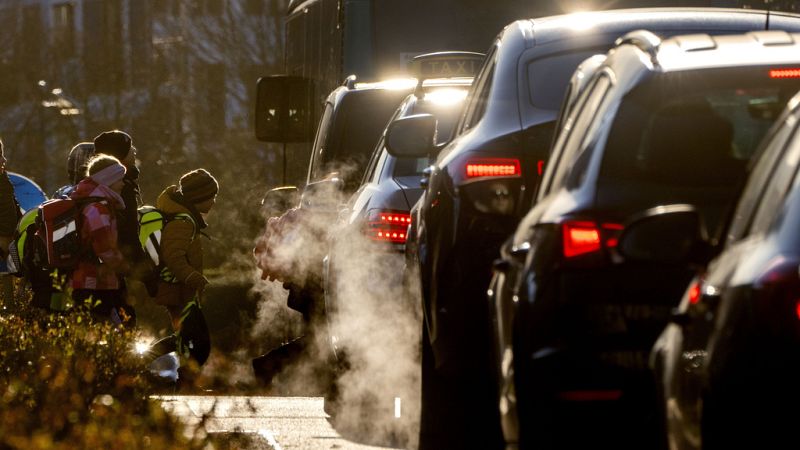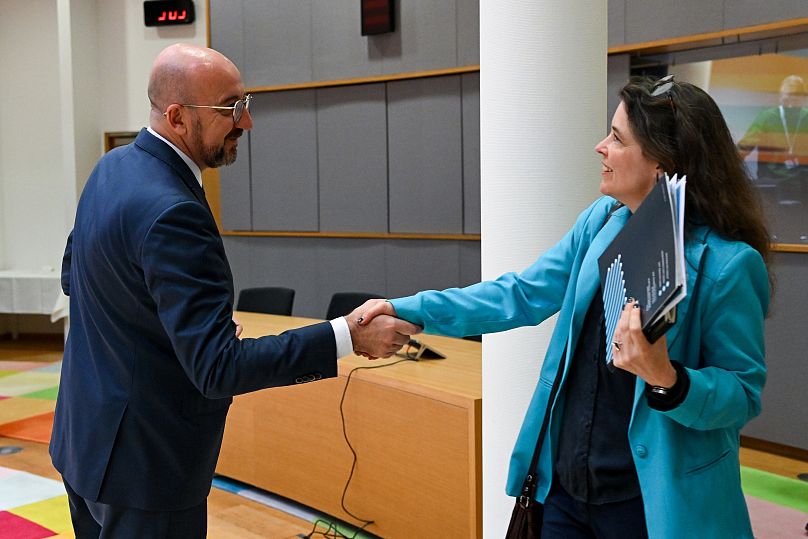Why are carmakers pleading for a respite from EU climate policy?

Sales of electric vehicles have plummeted, prompting carmakers to demand urgent intervention by the European Commission as they face huge fines for failure to comply with CO2 emissions standards.
But is the automotive sector’s predicament the result of the cost-of-living crisis and would-be buyers put off by a lack of charging infrastructure, or have manufacturers brought it upon themselves?
Euronews asked director general of the European Automobile Manufacturers' Association (ACEA), Sigrid de Vries, to explain why Europe’s largest car makers are pleading for leniency.
“We want to raise the flag and say, this is urgent!” de Vries said in a call with Euronews. “We see the trend declining, which is worrying, and that can have serious implications next year which we believe should be addressed now.”
ACEA highlighted the sales trend in question in a statement published the previous week: overall car sales fell over 18% year-on-year across the EU last month, with the market share of fully electric models falling from 21% to just over 14%.
This is a problem because the EU limit on CO2 emissions per kilometre is based on the average of all vehicles sold by a given manufacturer: if the share of zero-emissions cars falls, the overall average will go up.
The current maximum is 115.1 grammes per kilometre but it will drop to 93.6g next year. An even more stringent limit of 49.5g/km will apply from 2030 to 2034, before a zero-emission requirement kicks in from 2035 – a de facto ban on the sale of new petrol and diesel models.
Data released by the European Environment Agency in July shows just how far carmakers are falling behind: average emissions stood at 106.6g last year, a mere 1.4% lower than in 2022.
“We haven't reached the tipping point yet where it's a self-propelling transition – markets still need to be stimulated and encouraged,” de Vries says. “I don’t want to blame consumers at all…Not all countries are like my home country, the Netherlands, where you find a lot of charging infrastructure on almost [every street] corner.”
But ACEA wants more from EU policy makers and governments than support for the deployment of charging infrastructure to alleviate drivers’ range anxiety, considered a major disincentive for consumers mulling an EV purchase. De Vries also spoke of “purchasing or fiscal incentives to stimulate the market”.
Several countries have been subsidizing the purchase of electric cars, but one of the bigger schemes came to an abrupt end in December when Germany shut down a programme that has seen €10bn of public money funnelled into the purchase of 2.1m vehicles.
But the most pressing matter is the impending emissions standard, with 2025 “just around the corner,” as de Vries put it. Although she declined to specify concretely what measures ACEA wants to see put in place, with the lobby group foreseeing “multi-billion-euro fines,” it is clear that there would be a delay among them.
Under the law as it stands, carmakers would have to pay €95 per vehicle sold for every gram by which they exceed the limit.
The industry has allies among some national governments. Italy – whose prime minister Giorgia Meloni has described the internal combustion engine ban as “ideological madness” has been actively demanding a U-turn on this aspect of EU climate policy. Germany has joined in the call to give relief to the industry, although it stopped short of demanding the 2035 target be scrapped.
The largest group in European Parliament, the centre-right European People’s Party, has also demanded a rethink of car emissions limits, calling for a review of the 2035 target to be activated nearly two years early, at the beginning of 2025.
“I really don't want to pre-empt any proposal or decision [the Commission] might take,” de Vries said. “I think the urgency here is a key factor," she said, adding: “And it starts with the political recognition that there is an issue, and it needs addressing.”
But the EU executive has shown little sympathy so far. Speaking to reporters on 24 September, a spokesperson observed that carmakers still had 15 months to meet the target, and noted pointedly that it had been put in place back in 2019. “We have designed these policies in a way that the industry has time to adapt,” the official said.
De Vries denied the industry had been slow to act. “Not even a year ago, this trajectory looked much more promising because, indeed, manufacturers have done their homework,” she said. “They've invested over €250 billion into electrification - the vehicles, again, are not the bottleneck: it's the market that is missing.”
This appears to be a reference to a manifesto ACEA published in June in which member companies committed to invest that sum by 2030, while calling for political support and a move “beyond an approach focusing on piling up regulations”.
But have carmakers been complacent, and used what until recently appeared to be steadily increasing sales of electric vehicles to balance the emissions of ever larger cars, with the gas-guzzling sports utility vehicle (SUV) now the norm rather than the exception?
“We’re not at the zero emission target yet…that's still ten years away,” de Vries said. “So you have a transition to make and, you have to do that in a profitable way…in order to generate the revenues that you can use to make these investments.”
“And you have a market to reckon with,” she said, suggesting that carmakers are responding to consumer demand and noting that a lot of advertising now focuses on electric models. “To be able to make this transformation work, you need to be able to produce and manufacture in a profitable way – ideally in Europe.”
While the larger part of the car industry appears to be suffering from regulatory fatigue – de Vries was wary of stricter targets being ushered in “through the back door”, for example in the form of deadlines for the electrification of corporate fleets, as called for by Uber last week.
But the Commission is under pressure on more than one front. As well as preparing to propose a 90% economy-wide emissions cut by 2040, there is a vocal sector of industry urging the EU executive not a cave in to demands from the automotive lobby.
Fifty companies – including Uber, alongside IKEA, Polestar and its owner Volvo Cars – called today for EU lawmakers to stick to the 2035 target.
Volvo Cars quit ACEA in 2022 as it committed to produce only battery powered vehicles by 2030, but backpedalled this month, saying it now plans to ensure that at least nine out of every ten cars it sells will be either fully electric or plug-in hybrid models by the end of the decade.
One way or another, Europe’s car industry looks set to face some critical choices in the coming months and years, as the EU will inevitably have to ratchet up its climate action in line with the imminent new greenhouse gas reduction target.
This – as climate commissioner Wopke Hoekstra has intimated – is likely to go beyond the substitution (electric for petrol, boiler for heat pump) approach seen so far to a rethink of lifestyles and consumption models.
De Vries said the industry was not working on the assumption that car sharing and a switch to alternative forms of transport, especially in cities, would necessarily mean a further fall in demand for new cars.
“There is often not a one-size-fits-all solution for mobility,” de Vries said. “Looking into the services and the business opportunities that are there, it's not a worry about fewer cars…that drives us,” she said. “We believe mobility, including car use will [continue] to play an important role.”
Today


